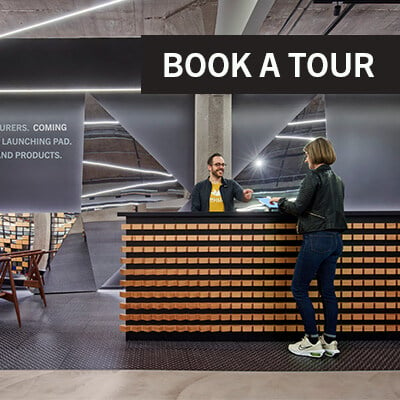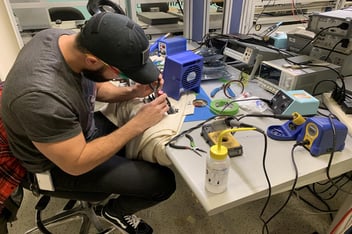Corporate Innovation as a Business-Wide Catalyst
Corporate innovation is no longer just the domain of R&D departments or siloed product teams. When done right, it becomes a business-wide catalyst — reshaping organizational culture, redefining how teams collaborate, and setting the pace for entire industries. It can change how a company thinks, behaves, and competes, with lasting impact on everything from product lines and operational efficiency to workforce development and market position.
However, the speed of technological change and disruption poses a real challenge. Even well-resourced companies often find themselves playing catch-up. The corporations best positioned to thrive in the future will be those that successfully drive innovation. Conversely, those that fail to do so risk falling into irrelevance.
But how can a company fuel innovation without wasting time and money? It starts with understanding why corporate innovation is so challenging—and how teaming up with the right partners can reduce risk and make those efforts more effective.
Why Is Corporate Innovation Difficult?
Most organizations don’t struggle with innovation due to lack of vision — they struggle because the process is riddled with structural and operational challenges. Innovation cycles are time-intensive, often requiring long lead times that conflict with quarterly ROI expectations.

The misalignment between long-term R&D efforts and short-term performance metrics can stall progress before it begins. This results in incremental wins instead of true innovation that can chart a new future course.
Measuring innovation is inherently difficult because innovation is novel and multi‑dimensional. There’s no universally accepted standard: organizations may track inputs like R&D spending or patents, outputs like product launches, or more subjective measures like innovation culture, but these rarely capture the full impact or strategic alignment.
At the same time, investing in innovation often means building expensive infrastructure, pulling key staff from daily operations, or navigating unfamiliar territory — particularly with emerging technologies where internal expertise may be limited. This creates execution risk and limits flexibility. And when efforts are focused on a single internal pathway, organizations lack diversification of risk, leaving little room to adapt if plans falter.
According to a 2022 report in the Harvard Business Review, 94% of tech executives view innovation partnerships as necessary to their strategy. But what does an effective innovation partnership look like in practice?
mHUB’s Partnership Model: A Strategic Advantage
mHUB offers an alternative to going it alone. Its flexible partnership model is based on a shared derisking that focuses on growth and operational efficiency through innovation. It allows corporations to develop new IP, pilot transformative technologies, invest in startup solutions, and scale innovation efforts — all within a single community purpose-built for hardtech commercialization.
Located on Chicago’s Near West Side, mHUB houses the largest independent physical product innovation center in the U.S., complete with 11 prototyping labs, $6M in equipment, and a dynamic ecosystem of engineers, startups, and corporate partners. It operates as a shared R&D engine and a neutral ground where startups and corporations co-develop the future.
By integrating corporate innovation into an intentional environment, mHUB shares in derisking spend, accelerates learning, and helps organizations inject agility into rigid structures — without pulling teams off core business priorities.

The Four Ways to Partner with mHUB
- Incubate: Corporations can embed product teams or brands within mHUB’s thriving ecosystem. With access to ready-to-use equipment and a curated community of engineers, technicians, and founders, partners benefit from a cross-pollination of ideas and technical expertise without the overhead of building internal capabilities from scratch. This is a light-touch approach to corporate innovation grounded in up-skilling, professional development, and nurturing a culture of innovation.
- Accelerate: Through tailored startup accelerators, like those focused on medtech or energy tech, corporate partners define challenge statements and engage with de-risked, venture-backed startups solving aligned problems. Companies like Endeavor Health and Constellation have piloted solutions and made strategic investments through this model, while also shaping industry thought leadership.
- Develop: Using mHUB’s HardTech Development Services, partners extend their own R&D teams with flexible, high-skilled contract talent. Marmon Holdings, for example, has launched over 10 product development sprints in partnership with mHUB, even commercializing a smart toaster now in 700+ locations — all while maintaining ownership of the IP.
- Invest: Through mHUB Ventures, partners can make early bets on the future by investing in pre-vetted hardtech startups. With over 79 institutional and individual investors, the fund offers an opportunity to co-invest in technologies shaped through mHUB’s ecosystem, further de-risked by hands-on technical and entrepreneurial support.
Rewriting the Innovation Equation
Having a partner like mHUB gives corporations the ability to scale innovation efforts without compromising core operations. Whether the goal is faster product development, access to novel IP, or deeper engagement with the startup landscape, mHUB provides the structure, talent, and infrastructure to make innovation a repeatable success — not a one-time experiment.
Explore what’s possible at mhubchicago.com/corporate-innovation.





